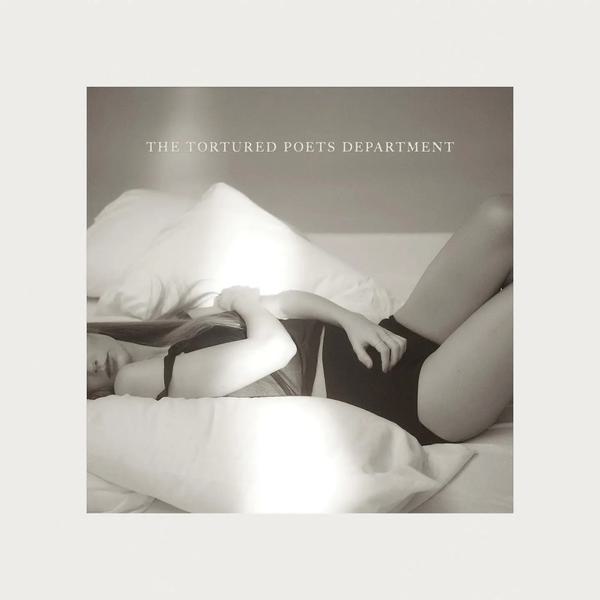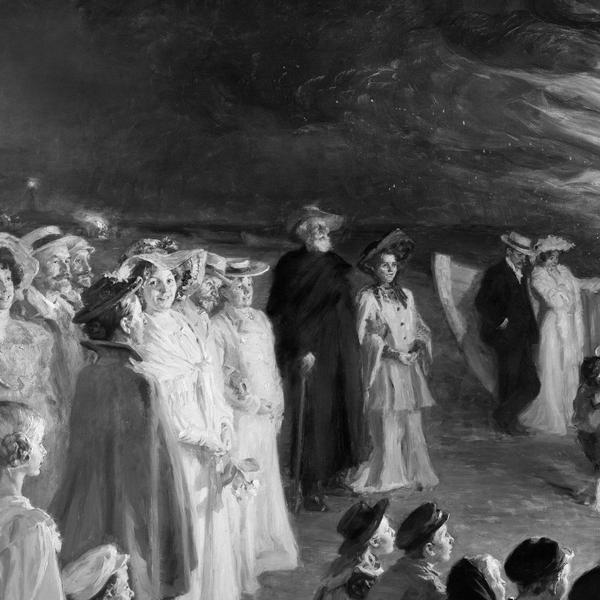"Spectre"

There’s little indication ground as Spectre begins that we’re on unfamiliar ground. First track “The Whistleblowers” kicks off with (appropriately enough) whistling, along with rolling military drums, Wagnerian orchestral stomp, sweeping waves of instrumentation, and all the other elements that make Laibach’s music such a great soundtrack for an ironic gym session or the armed invasion of small, neutral country. When lead vocalist Milan Fras comes in it’s clear something’s changed: his usual sandpaper growl is still there, but it sounds like one of utter exhaustion. A note of uncertainty seems to have seeped into the music, and all the Laibach-isms are strangely distorted. “We walk and we stand tall”, Fras rasps. “As weak as the sky, as far as the dawn”. It’s more a desperate last stand than a triumphant world-historical victory, more Tarkovsky than Eisenstein.
Not that Laibach have lost any of their power, but the tone is now set far more by the instrumentation. The big pounding rhythms have for the most part given way to slickly programmed drums; there are even a few nods to dubstep and trap in the angular syncopation and skittering hi-hats. Some tracks – in particular “Americana” and “Eurovision” – are delightfully sinister, brimming with oily lapping waves of electronic queasiness. On the latter track Fras’ voice is full of menace, but there’s still a pervasive sense of defeat. “Europe is falling apart”, he intones, and you can almost hear the cities crumbling in his throat. Others – “Eat Liver” and “Bossanova” – are full-on sonic assaults. “Resistance Is Futile” is a bizarre fractured homage to the kind of 80s synthpop degeneracy that Laibach might have missed out on the first time round living in Titoist Yugoslavia – but despite its strangeness and its Star Trek references, it almost works. The closer, “Koran”, is most unexpected of all: a delicate, ethereal piano ballad.
From the album’s title, and the odd lyric (“The future is invisible/Words are something that remain”) it seems that Laibach have been reading some Derrida. It’s certainly more overtly political than most of their work to date: “The Whistleblowers” seems to be a tribute to Snowden, Manning, Assange, et al; there are references to the long-defunct Occupy Wall Street movement and to “the corporations”; a recurring motif is the idea of a new and better world, with freedom and equality for all. This looks like a radical change of direction for the group, whose approach to politics has always been masked with irony, military marches, and suspiciously snazzy uniforms. “We are fascists in the same way that Hitler was a painter”, they once claimed. Cover songs like “Opus Dei” (Opus’s “Live is Life”) or “Geburt einer Nation” (Queen’s “One Vision”) weren’t trying to make pop music safe for the far right, they were uncovering the fascism already latent in the bland cheerful affirmationism of pop. It was a strategy of what their fellow Slovene and long-standing fan Slavoj Zizek calls ‘overidentification’: taking it all more seriously than it takes itself. When they attach themselves so earnestly to a political project – especially one as insipid as Occupy-style social democracy – some of the charm wears off. Mina Špiler – who takes over a lot of the vocal duties on Spectre – is never exactly euphoric, but some of her rushingly imperative delivery sounds like the kind of thing that Laibach once lampooned so expertly. And a couple of the lines are just naff. “Wanna do it now, it’s time for the show”? “If you want to change the system, get out on the street/Cause if you don’t, you’ll hear a different beat”? Really?
Of course, this is Laibach, and things are never what they seem. “The Whistleblowers”, for instance, seems to be a hagiography of those brave individuals who stand up against the security and intelligence behemoths of our time – but then there’s that martial beat, and the constant use of the first person plural pronoun. “We breathe as one/Living in fame, or dying in flames”. There’s something very militaristic about this pacifism, the suggestion that these liberal heroes might be the objects of a sinister personality cult. In “Koran”, the “better place” is one of “brotherhood, equality and freedom” – in other words, the motto of the French state. There’s a sense of exhaustion in Spectre, but it’s not an exhaustion with irony and a refuge in po-faced sloganeering. Rather, Laibach dramatise the exhausted nature of a political movement that seems unable to do anything other than follow the lines laid out for it by the social order it claims to oppose, or take refuge in a vague utopianism. And if they can confuse a lot of people and piss off some of their fans along the way, then why not?
Get the Best Fit take on the week in music direct to your inbox every Friday

Taylor Swift
The Tortured Poets Department

Chanel Beads
Your Day Will Come

Lucy Rose
This Ain't The Way You Go Out





